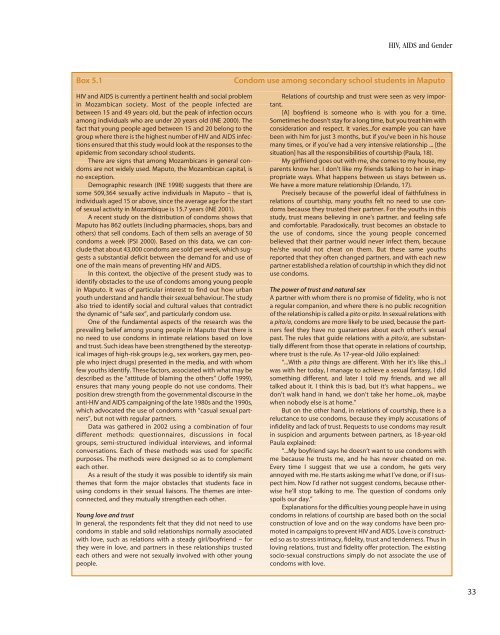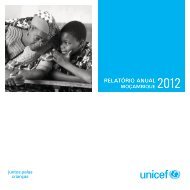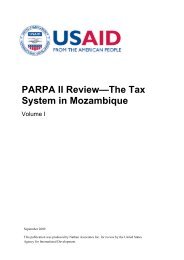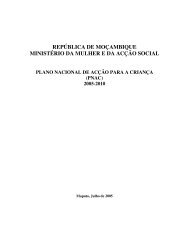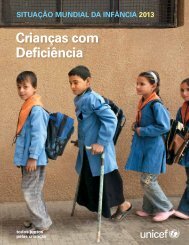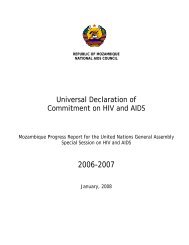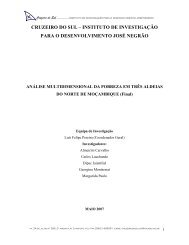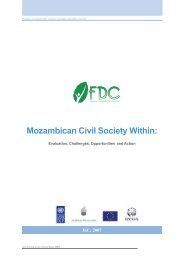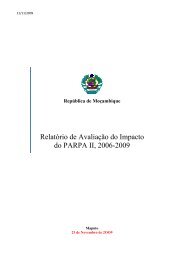English language version - Human Development Reports - United ...
English language version - Human Development Reports - United ...
English language version - Human Development Reports - United ...
- No tags were found...
You also want an ePaper? Increase the reach of your titles
YUMPU automatically turns print PDFs into web optimized ePapers that Google loves.
HIV, AIDS and GenderBox 5.1Condom use among secondary school students in MaputoHIV and AIDS is currently a pertinent health and social problemin Mozambican society. Most of the people infected arebetween 15 and 49 years old, but the peak of infection occursamong individuals who are under 20 years old (INE 2000). Thefact that young people aged between 15 and 20 belong to thegroup where there is the highest number of HIV and AIDS infectionsensured that this study would look at the responses to theepidemic from secondary school students.There are signs that among Mozambicans in general condomsare not widely used. Maputo, the Mozambican capital, isno exception.Demographic research (INE 1998) suggests that there aresome 509,364 sexually active individuals in Maputo – that is,individuals aged 15 or above, since the average age for the startof sexual activity in Mozambique is 15.7 years (INE 2001).A recent study on the distribution of condoms shows thatMaputo has 862 outlets (including pharmacies, shops, bars andothers) that sell condoms. Each of them sells an average of 50condoms a week (PSI 2000). Based on this data, we can concludethat about 43,000 condoms are sold per week, which suggestsa substantial deficit between the demand for and use ofone of the main means of preventing HIV and AIDS.In this context, the objective of the present study was toidentify obstacles to the use of condoms among young peoplein Maputo. It was of particular interest to find out how urbanyouth understand and handle their sexual behaviour. The studyalso tried to identify social and cultural values that contradictthe dynamic of “safe sex”, and particularly condom use.One of the fundamental aspects of the research was theprevailing belief among young people in Maputo that there isno need to use condoms in intimate relations based on loveand trust. Such ideas have been strengthened by the stereotypicalimages of high-risk groups (e.g., sex workers, gay men, peoplewho inject drugs) presented in the media, and with whomfew youths identify. These factors, associated with what may bedescribed as the “attitude of blaming the others” (Joffe 1999),ensures that many young people do not use condoms. Theirposition drew strength from the governmental discourse in theanti-HIV and AIDS campaigning of the late 1980s and the 1990s,which advocated the use of condoms with “casual sexual partners”,but not with regular partners.Data was gathered in 2002 using a combination of fourdifferent methods: questionnaires, discussions in focalgroups, semi-structured individual interviews, and informalconversations. Each of these methods was used for specificpurposes. The methods were designed so as to complementeach other.As a result of the study it was possible to identify six mainthemes that form the major obstacles that students face inusing condoms in their sexual liaisons. The themes are interconnected,and they mutually strengthen each other.Young love and trustIn general, the respondents felt that they did not need to usecondoms in stable and solid relationships normally associatedwith love, such as relations with a steady girl/boyfriend – forthey were in love, and partners in these relationships trustedeach others and were not sexually involved with other youngpeople.Relations of courtship and trust were seen as very important.[A] boyfriend is someone who is with you for a time.Sometimes he doesn’t stay for a long time, but you treat him withconsideration and respect. It varies...for example you can havebeen with him for just 3 months, but if you’ve been in his housemany times, or if you’ve had a very intensive relationship ... [thesituation] has all the responsibilities of courtship (Paula, 18).My girlfriend goes out with me, she comes to my house, myparents know her. I don’t like my friends talking to her in inappropriateways. What happens between us stays between us.We have a more mature relationship (Orlando, 17).Precisely because of the powerful ideal of faithfulness inrelations of courtship, many youths felt no need to use condomsbecause they trusted their partner. For the youths in thisstudy, trust means believing in one’s partner, and feeling safeand comfortable. Paradoxically, trust becomes an obstacle tothe use of condoms, since the young people concernedbelieved that their partner would never infect them, becausehe/she would not cheat on them. But these same youthsreported that they often changed partners, and with each newpartner established a relation of courtship in which they did notuse condoms.The power of trust and natural sexA partner with whom there is no promise of fidelity, who is nota regular companion, and where there is no public recognitionof the relationship is called a pito or pita. In sexual relations witha pito/a, condoms are more likely to be used, because the partnersfeel they have no guarantees about each other’s sexualpast. The rules that guide relations with a pito/a, are substantiallydifferent from those that operate in relations of courtship,where trust is the rule. As 17-year-old Júlio explained:“...With a pita things are different. With her it’s like this...Iwas with her today, I manage to achieve a sexual fantasy, I didsomething different, and later I told my friends, and we alltalked about it. I think this is bad, but it’s what happens... wedon’t walk hand in hand, we don’t take her home...ok, maybewhen nobody else is at home.”But on the other hand, in relations of courtship, there is areluctance to use condoms, because they imply accusations ofinfidelity and lack of trust. Requests to use condoms may resultin suspicion and arguments between partners, as 18-year-oldPaula explained:“...My boyfriend says he doesn’t want to use condoms withme because he trusts me, and he has never cheated on me.Every time I suggest that we use a condom, he gets veryannoyed with me. He starts asking me what I’ve done, or if I suspecthim. Now I’d rather not suggest condoms, because otherwisehe’ll stop talking to me. The question of condoms onlyspoils our day.”Explanations for the difficulties young people have in usingcondoms in relations of courtship are based both on the socialconstruction of love and on the way condoms have been promotedin campaigns to prevent HIV and AIDS. Love is constructedso as to stress intimacy, fidelity, trust and tenderness. Thus inloving relations, trust and fidelity offer protection. The existingsocio-sexual constructions simply do not associate the use ofcondoms with love.33


